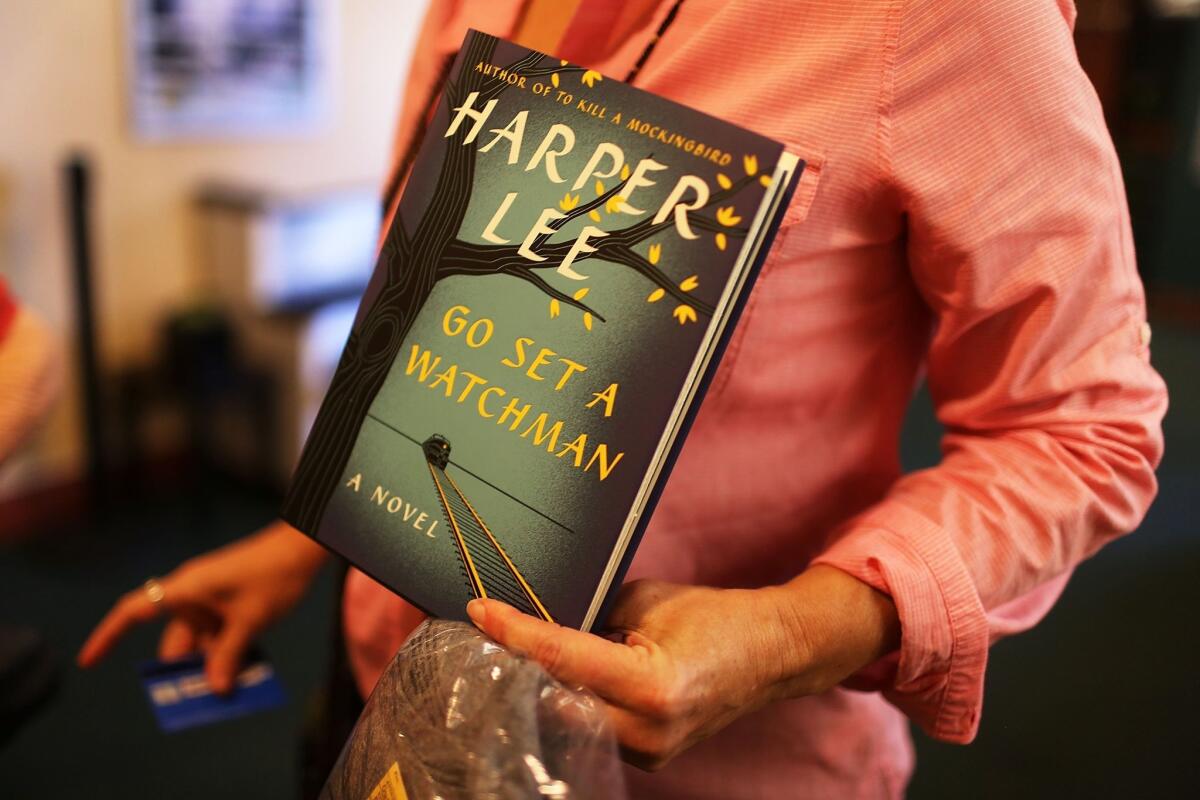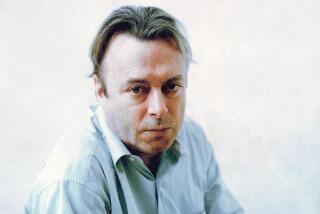What the critics are saying about Harper Lee’s ‘Go Set a Watchman’

Jennie Hausler waits to pay for a copy of “Go Set a Watchman” at the Books and Books store on Tuesday in Coral Gables, Fla.
- Share via
After five decades, readers are finally returning to Maycomb, the fictional Alabama town of Harper Lee’s beloved 1960 novel “To Kill a Mockingbird,” only to find one of its most famous residents nearly unrecognizable.
Lee’s “Go Set a Watchman” hits shelves Tuesday, and the buzz — which already has been at a fever pitch for weeks — has gone into overdrive with the arrival of the first reviews.
It came as a surprise to many critics that the Atticus Finch of “Watchman” — written and shelved in 1957, before Lee radically transformed the book into “Mockingbird” — is a segregationist bigot who disparages the NAACP and once attended a Klan rally. Has that revelation (and others) tarnished the inspirational idealism of “To Kill a Mockingbird”? And, more broadly, does “Watchman” live up to “Mockingbird’s” legacy?
Video: Don’t write Atticus Finch off as a racist just yet
In his Times review, David Ulin stresses the fact that “Watchman” isn’t really a sequel at all, but should be treated more as a radically different rough draft of “Mockingbird” — flaws and all.
“Promise, however, remains the operative word,” he contends, “for ‘Go Set a Watchman’ is an apprentice effort, and falls apart in the second half.” Noting that some descriptive passages are nearly identical to those found in “Mockingbird,” Ulin concludes that the book is “most interesting as a literary artifact” that “suggests a vivid set of contradictions, as much between the author and the character as between the character and himself.”
The Guardian’s Mark Lawson takes an opposing view, noting, “Regardless of whether the new book is regarded as Mockingbird 2 or Mockingbird 1.0, it is, in most respects, a new work, and a pleasure, revelation and genuine literary event, akin to the discovery of extra sections from T S Eliot’s ‘The Waste Land’ or a missing act from ‘Hamlet’ hinting that the prince may have killed his father.”
Former U.S. poet laureate Natasha Trethewey writes in the Guardian of the book’s useful historical context. “ ‘Watchman’ is compelling in its timeliness,” she writes. “During the historical moment in which the novel takes place, in states such as Georgia and South Carolina, legislators had begun to authorize the raising of the Confederate flag over the statehouse or the incorporation of it into the design of state flags as a reaction and opposition to the Supreme Court’s decision — thus inscribing the kind of white Southern anxiety dramatized in Lee’s novel.”
MORE: 23 fiction books you’ll want to read — and share — this summer
The Independent’s Arifa Akbar calls “Watchman” a “rough diamond,” adding that “it is not a finely written story,” and that it “reads as a ‘good’ first draft which Lee has refused to rework.” Despite its jagged edges, “Watchman” is, according to Akbar, “the more radical, ambitious and politicised of the two novels Lee has now published.”
Critics have expressed shock at the fact that the Atticus readers grew to love has been recast as a racist. Writing in the New York Times, Michiko Kakutani notes that “ ‘Mockingbird’ suggested that we should have compassion for outsiders like Boo [Radley] and Tom Robinson, while ‘Watchman’ asks us to have understanding for a bigot named Atticus.”
Akbar likewise laments, “we will never be able to read ‘Mockingbird’ in the same way again, and never see Atticus in the same light again. It is the end of innocence for that novel, and its simple idealism.”
Time Magazine’s Daniel D’Addario acknowledges that “Watchman” is “alienating from the very start,” but suggests that Atticus’ bigoted worldview isn’t as much of a 180 as some are suggesting. “Atticus isn’t — never was — a bland fighter for what is empirically right,” he writes. “His true heart, expressed in a lengthy debate with Jean Louise, actually squares neatly with the paternalistic attitude Atticus takes towards black people in ‘To Kill a Mockingbird,’ and his occasionally overwrought compassion for his racist white neighbors.”
Over at Entertainment Weekly, Tina Jordan gives the book a D+, damning it with four simple words: “ ‘Watchman’ is a mess.” She notes that though it “has a few stunning passages, it reads, for the most part, like a sluggishly-paced first draft, replete with incongruities, bad dialogue, and underdeveloped characters, because it is a first draft — of Mockingbird.’ ”
Readers may be further dismayed by the surprising fate of another of “Mockingbird’s” major characters (there may not be much point trying to stay spoiler-free at this point, but we won’t tell you who), adding to the tome’s dark tone.
The Wall Street Journal’s Sam Sacks calls it “a distressing book, one that delivers a startling rebuttal to the shining idealism of ‘To Kill a Mockingbird.’ This story is of the toppling of idols; its major theme is disillusion.”
For readers, he adds, the new book “will be a test of their tolerance and capacity for forgiveness. At the peak of her outrage, Jean Louise tells her father, ‘You’ve cheated me in a way that’s inexpressible.’ I don’t doubt that many who read this novel are going to feel the same way.”
Maureen Corrigan’s NPR review sums it up thusly: “Everybody who loves ‘To Kill a Mockingbird’ is going to read it, no matter what I or any other reviewer says about its literary quality, the bizarre transformation of Atticus or its odd provenance. All I know for certain is that ‘Go Set a Watchman’ is kind of a mess that will forever change the way we read a masterpiece.”
ALSO:
Reese Witherspoon will be the voice of the new Scout
Harper Lee’s hometown in a frenzy over ‘Go Set a Watchman’ release
Summer reading guide: The 136 books you’ll want to read
More to Read
Sign up for our Book Club newsletter
Get the latest news, events and more from the Los Angeles Times Book Club, and help us get L.A. reading and talking.
You may occasionally receive promotional content from the Los Angeles Times.









